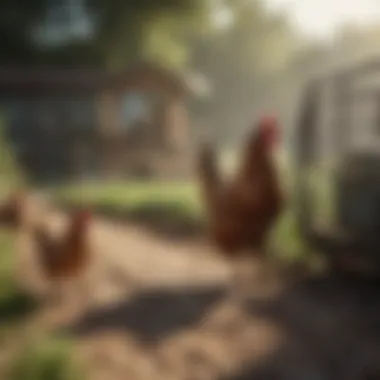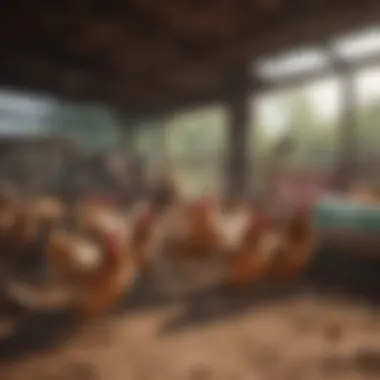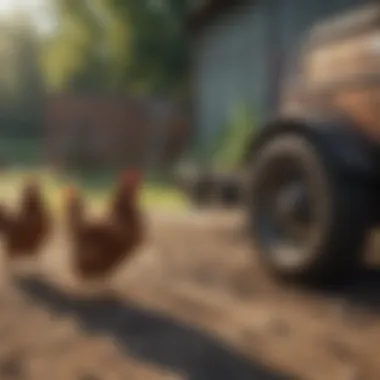The Ultimate Guide to Selecting a Chicken Tractor


Intro
In the world of poultry farming, the importance of having a reliable and functional chicken tractor cannot be overstated. Chicken tractors offer a safe and portable environment for chickens, providing them with access to fresh grass and insects, while also protecting them from predators. Whether you are a novice looking to start your first flock or an experienced farmer seeking to optimize productivity, understanding the intricacies of chicken tractors is crucial.
This guide will serve as your roadmap through the process of buying a chicken tractor. From construction details and benefits to maintenance considerations, each aspect will be explored thoroughly. Novices and seasoned poultry enthusiasts alike will find value in the information presented here, ensuring informed decision-making in choosing the right tractor for their needs. Let’s delve into the essential elements of this subject.
Key Considerations in Buying a Chicken Tractor
Understanding why you need a chicken tractor is pivotal.
- Portability: Chicken tractors are designed for easy movement. This helps in providing fresh forage for your chickens without depleting one area of your yard.
- Protection: A well-constructed chicken tractor provides safety against predators, giving your flock a secure environment to roam.
- Nutritional Benefits: Chickens that forage tend to have better health and egg production due to a varied diet.
- Simplified Cleaning: Elevated designs allow for easier waste management.
These points outline not just the practicalities associated with chicken tractors, but also their benefits to the overall health of your flock.
Construction of Chicken Tractors
When it comes to construction, a chicken tractor must be sturdy enough to withstand elements and predators but also lightweight enough for movement. Typical materials include wood, PVC pipes, and wire mesh. Consider the following:
- Frame and Structure: Choose materials that resist rot and corrosion.
- Size and Space: Ensure the tractor is spacious enough to accommodate the number of chickens you plan to keep.
- Ventilation: Proper airflow is essential to prevent overheating in warmer months.
These features contribute significantly to the longevity and functionality of the tractor.
Maintenance and Care
Maintenance practices should be part of your chicken tractor routine. Regular inspection can help identify wear and tear, ensuring the structure remains safe. Moreover, periodically clean the inside to maintain a healthy environment for your flock.
Key tips include:
- Inspect for damages monthly.
- Clean waste regularly to prevent build-up.
- Lubricate wheels and hinges to ensure smooth operation.
Understanding these aspects will maximize the life of your chicken tractor while ensuring a healthy atmosphere for your hens.
Prologue to Chicken Tractors
Chicken tractors have gained popularity among poultry enthusiasts and small-scale farmers. Their design is a simple yet effective method for raising chickens while preserving soil health and providing natural pest control. In this section, we will outline the definition and purpose of chicken tractors, as well as examine the historical context that has contributed to their usefulness in sustainable farming practices.
Definition and Purpose
A chicken tractor is a mobile coop designed to contain chickens while allowing them to access fresh grass and soil. Unlike traditional coops that are stationary, chicken tractors allow the birds to forage and move around, aiding in their well-being. The primary purpose of these structures is to provide a safe space for chickens to roam while also contributing positively to the environment. The mobility aspect enables farmers to relocate the tractor frequently, ensuring that chickens enjoy fresh pastures and that the land is not overgrazed.
Key benefits of chicken tractors include:
- Soil enrichment: Chicken manure acts as a natural fertilizer, improving the nutrient content of the soil.
- Weed control: Chickens enjoy eating weeds, which helps maintain a healthier yard or farm area.
- Natural exercise: The chickens' ability to roam supports their physical health and fosters natural behaviors.
Overall, chicken tractors serve a multifaceted purpose, enhancing both the poultry raising experience and overall ecological balance.
Historical Context
The concept of chicken tractors is rooted in traditional farming practices, where livestock was often moved to different grazing areas to optimize land use. The modern chicken tractor draws inspiration from these age-old methods. Early farmers recognized the benefits of allowing poultry to forage naturally, leading to the development of structures that would contain the birds while enabling mobility.
With the rise of industrial agriculture practices in the 20th century, many sustainable practices were overlooked. However, as awareness of sustainable farming has grown, interest in chicken tractors has risen once more. Today, they are seen as essential tools for those who prioritize environmental stewardship along with animal welfare. By studying their usage in history, modern farmers can better appreciate their significance and value in today's farming ecosystem.
Chicken tractors not only improve poultry health but also foster a more sustainable approach to farming by enriching the soil and managing pests naturally.
Benefits of Using a Chicken Tractor
Using a chicken tractor brings several valuable benefits. These devices are not just for raising chickens; they also contribute positively to farming practices and the environment. The simplicity and effectiveness of chicken tractors allow poultry enthusiasts to engage in sustainable practices while ensuring the health and productivity of their birds. Understanding the benefits becomes crucial for anyone considering this investment, whether they are novices or experienced poultry keepers.
Soil Health Improvement
One of the standout advantages of chicken tractors is their ability to improve soil health. Chickens graze naturally, and by rotating them through different areas, they contribute to the overall fertility of the land. As they scratch the ground, chickens aerate the soil and spread their manure, which acts as a natural fertilizer. This process enhances the nutrient content, benefiting plants grown in those areas.
Moreover, chicken droppings are high in nitrogen, phosphorus, and potassium, which are essential nutrients for plant growth. The combination of foraging and fertilization leads to richer soil, supporting a thriving ecosystem. Over time, this practice can result in higher crop yields, making it an excellent strategy for those who also engage in gardening or farming alongside poultry rearing.
Pest Control
Another essential benefit of using a chicken tractor is pest control. Chickens are natural foragers and will eat a variety of insects, including grasshoppers, beetles, and even small rodents. By incorporating chickens into a rotational grazing system, they can effectively help manage pests in the garden or pasture.
By allowing chickens to roam within a defined area, you can significantly reduce pest populations without the need for chemical pesticides. This organic approach not only protects your plants but also promotes a healthier environment for both the birds and the soil. Hence, chicken tractors serve as a proactive measure in integrated pest management strategies, ensuring sustainability in agricultural practices.
Convenience and Flexibility
Lastly, chicken tractors offer remarkable convenience and flexibility. Unlike traditional chicken coops, chicken tractors are movable, which allows for easy relocation. This mobility enables chicken owners to manage their flocks in ways that suit their specific needs and conditions.


Moving a chicken tractor daily or weekly provides fresh grass for the birds and minimizes the buildup of waste in any single area. This approach prevents overgrazing and allows the ground to recover, promoting healthier living conditions for the chickens. Additionally, it simplifies the task of cleaning and maintenance. Owners can easily access different sections of their lawn or farm without the arduous task of cleaning a permanent structure.
In summary, chicken tractors serve multiple purposes that promote better soil health, effective pest control, and increased convenience for poultry enthusiasts. These benefits are integral in ensuring that both the chickens and the land they inhabit thrive together harmoniously.
Key Features to Consider
When selecting a chicken tractor, understanding the key features is crucial. Each feature can greatly influence the overall suitability of the tractor for your specific needs. This section breaks down essential elements like size and capacity, material considerations, mobility options, and ventilation and protection. Keeping these factors in mind can lead to a more informed and satisfying purchase.
Size and Capacity
Size is perhaps the most important aspect to consider when choosing a chicken tractor. A larger tractor provides more space for the chickens to roam, which can lead to better health and well-being. However, the size must correspond to the number of chickens you plan to keep. Usually, a general guideline is about 2 to 4 square feet per bird, depending on their breed and space needs.
Capacity also relates to how many chickens you can raise sustainably. It's better to err on the side of caution and plan for future growth. If you start with a small flock, you may wish to expand later. Assessing both size and capacity can help ensure a successful and productive experience with your chickens.
Material Considerations
Selecting the right material for the chicken tractor affects its longevity and functionality.
Wood
Wood is a classic choice for chicken tractors. Its natural insulating properties help to maintain a suitable temperature inside the tractor. People often appreciate wooden tractors for their aesthetic appeal, blending well with the backyard landscape. However, wood can be prone to rot and insect damage unless it is treated properly. Choosing a durable wood and maintaining it with weather-resistant finishes can improve its lifespan. Thus, wood often remains a beneficial option for many poultry keepers.
Metal
Metal is increasingly popular for chicken tractors. It provides unmatched durability against weather elements and pests, ensuring that your chickens remain safe. Metal tractors typically offer a modern appearance and are easier to clean than wooden models. That said, metal can heat up quickly under the sun, which may lead to overheating in hot climates. When picking metal, consider options with insulated panels to mitigate this issue, securing a more comfortable environment for your chickens.
Plastic
Plastic offers a lightweight alternative for constructing chicken tractors. Its resistance to rot and pests is a key advantage. Additionally, plastic is easier to clean and often comes in various colors, making it visually appealing. On the downside, plastic may not hold up as well against extreme temperatures compared to wood or metal. Thus, if you live in an area with harsh conditions, you might want to think carefully about this selection.
Mobility Options
Mobility is another vital feature to consider. A portable chicken tractor allows you to move your chickens to fresh ground, promoting better health and preventing overgrazing. Look for models with wheels or handles that facilitate movement. A well-designed movable tractor can also help to maximize the benefits of pasture and reduce the need for additional feeding.
Ventilation and Protection
Finally, ventilation and protection are non-negotiable elements in a chicken tractor. Proper ventilation helps in managing the temperature and prevents respiratory issues within the flock. Ensure that the design allows for adequate air flow, especially if you live in humid regions. At the same time, protection from predators is essential. Look for tractors with sturdy construction and secure closures to keep your chickens safe from possible threats. This balance will protect their well-being and safeguard their environment.
Keeping a chicken tractor secure and well-ventilated is not just desirable; it is critical for the health and safety of your flock.
Types of Chicken Tractors
Understanding the various types of chicken tractors is essential when considering a purchase. Different styles serve distinct purposes, and knowing the benefits and limitations can help you make an informed choice. Selecting the right type is not just about functionality; it also affects the well-being of your chickens, the condition of your soil, and how easily you can manage your poultry.
Homemade Tractors
Homemade chicken tractors offer flexibility and customization that commercially available options might not provide. When creating your own, you can adjust the dimensions and features based on your specific needs and landscape. This allows for a tailored design that may enhance your chicken's foraging experience and protects them from predators.
A homemade tractor can be built from materials you have on hand or sourced locally at a lower cost. Common materials include wood, scrap metal, or even plastic. However, building your tractor requires some basic skills in construction. If you're handy, you can design a setup that meets your requirements effectively. Otherwise, it might require a learning curve.
Pros of homemade tractors:
- Customizability
- Cost-effectiveness
- Personal satisfaction
Cons to consider:
- Time-consuming to build
- Needs maintenance from wear and tear
Commercially Available Options
Commercially available chicken tractors are practical choices for those who prefer convenience over DIY projects. These products often come fully assembled or with easy-to-follow instructions. They generally have features tailored for different chicken breeds, sizes, and climates.
Such options tend to guarantee a standardized level of quality and durability. Sellers may offer warranties and customer support, which is beneficial for first-time chicken keepers. Leading brands include Omlet and Catalyst, which provide various designs suited for both small and large flocks.
However, always weigh the price against the features. Some commercially available models can be pricey, yet may lack critical features for your specific needs. Conducting research and reading user reviews can guide you in choosing a reliable option.
Pros of commercially available options:
- Ease of purchase
- Often come with warranties
- Professionally designed for specific needs
Cons may include:
- Higher costs
- Limited customization options
Specialized Designs


Specialized chicken tractor designs cater to specific requirements or challenges faced by poultry keepers. These may include tractors for particular climates, breeding purposes, or specific land conditions. For example, some models incorporate insulation for cooler climates or special ventilation systems to protect against heat.
These units might also offer unique features like self-feeding systems or automatic watering setups. Such features typically reduce the workload for keepers, allowing for more efficient management of your flock.
While these designs might be more expensive, they provide additional benefits. If you have a unique situation or specific needs, specialized options are worth considering.
Key traits of specialized chicken tractors include:
- Climate control features
- Enhanced predator protection
- Automated feeding or watering
Investing in the right type of chicken tractor, whether homemade, commercially available, or specialized, can greatly influence both your experience as a poultry keeper and the health of your chickens. Thus, a thorough evaluation is essential before making a decision.
Where to Buy a Chicken Tractor
Finding the right place to buy a chicken tractor is crucial for ensuring you get a quality product that fits your needs. This decision affects not only the financial aspect but also the long-term success of raising chickens. By understanding various purchasing options, buyers can make informed choices that align with their goals, whether for hobby farming or sustainable living. Each buying option presents its unique advantages, considering elements like pricing, quality, and support.
Local Farms and Feed Stores
Purchasing a chicken tractor from local farms and feed stores includes several benefits. First, you get to see the tractor in person, which allows for a more tactile evaluation of the material and craftsmanship. This direct inspection can reveal important details that might be absent in online listings.
Local stores may also offer advice on which type of chicken tractor best suits your specific area and needs. Staff are often knowledgeable and can provide insights into local weather conditions, soil, and even pest problems you may face. The support from local businesses fosters community relationships that can be hugely beneficial in your poultry-raising journey.
- Ability to see the product firsthand
- Expert advice tailored to local conditions
- Support local economy and businesses
However, the selection may be limited depending on the store size and available stock. Prices may also vary compared to online marketplaces.
Online Marketplaces
Online marketplaces offer a wide array of options for chicken tractors. Platforms such as Amazon, eBay, and Craigslist have thousands of listings available. The convenience of shopping from home is a strong advantage, as it allows you to compare prices and features side by side. Furthermore, it is easier to read multiple user reviews and ratings, which can give insight into the product's performance and longevity.
When purchasing online, keep in mind the following considerations:
- Read product reviews carefully.
- Ensure delivery options are reliable and cost-effective.
- Pay attention to return policies in case the tractor does not meet your expectations.
While prices may sometimes be cheaper online, the trade-off is often the inability to inspect the tractor before buying. Therefore, research is crucial.
Specialty Poultry Suppliers
Specialty poultry suppliers focus specifically on products for raising chickens, including chicken tractors. These suppliers often provide a curated selection of items tailored for various poultry care needs. As a result, buyers can find specialized designs that may not be available elsewhere.
These suppliers frequently offer the following:
- High-quality, durable materials designed for long-term use.
- Customization options to meet specific needs.
- Experienced insights from staff who are likely dedicated to poultry care.
Finding a specialty supplier may take more time, but the investment often leads to higher satisfaction. In addition, supporting these niche suppliers helps strengthen the poultry community.
Finding the right chicken tractor can impact not just your budget but also your entire poultry experience. Each buying option has unique advantages, and understanding these can lead to a better-informed purchasing decision.
Evaluating Quality and Value
When purchasing a chicken tractor, understanding quality and value is crucial. This evaluation guides potential buyers to make informed decisions. Not all chicken tractors are built the same. Factors like materials, construction techniques, and user reviews heavily influence both durability and long-term satisfaction.
Material Durability
Material durability is a primary factor in assessing quality. A chicken tractor should withstand environmental factors such as wind, rain, and the wear caused by chickens. Common materials include wood, metal, and plastic. Each has its own merits and demerits.
- Wood: Offers good insulation but may decay over time without treatment.
- Metal: Known for its strength and resistance to weather but can be prone to rust if not treated properly.
- Plastic: Lightweight and resistant to rot, yet it may not hold up against predators as well as other materials.
Investing in a chicken tractor made from high-quality materials can save costs in repairs and replacements. Additionally, a durable chicken tractor can provide a safe environment for your chickens, leading to healthier poultry.
Warranty Information
Warranties provide significant insight into the manufacturer's confidence in their product. A longer warranty can indicate higher quality. When evaluating, consider what the warranty covers. Does it protect against all types of defects or just certain issues? Some manufacturers might offer a satisfaction guarantee, which adds an extra layer of assurance. In general, purchasing a chicken tractor with a solid warranty can prevent future headaches and unexpected expenses, ensuring peace of mind.
User Reviews and Recommendations
User reviews offer firsthand insights into experiences with specific chicken tractors. Look for reviews that mention durability, ease of use, and customer service experience of the manufacturer. Comments on the effectiveness of predator protection and ease of cleaning are also valuable.
Here is how you can evaluate them:
- Check multiple platforms: Websites like Reddit or Facebook groups can provide more honest opinions.
- Search for common issues: Focus on reviews with repeated concerns. This can highlight flaws in a model.
- Consider the number of reviews: A product with many reviews may often provide a clearer picture than one with very few.
By researching user feedback, one can avoid common pitfalls and select a chicken tractor that meets their needs.
Overall, assessing quality and value in the process of buying a chicken tractor requires careful consideration of material durability, helpful warranty information, and comprehensive user reviews. Each element contributes significantly to the effectiveness and longevity of your investment.


Initial Setup and Configuration
Setting up a chicken tractor is not just about choosing a model and putting it together. The initial setup and configuration phase significantly influences the productivity and health of your chickens. If you do it right, your chickens will thrive, giving you eggs and helping with pest control. Here are two main aspects to consider in this stage.
Choosing the Right Location
The location of your chicken tractor is critcal. It affects factors like sunlight, access to water, and the chicken's overall health. Here are some points to consider:
- Sunlight: Chickens need sunlight for their well-being and production. Ensure that the tractor is positioned in an area that receives adequate sunlight during the day.
- Shelter: The the location should offer some shelter from harsh weather conditions. This is important for protecting the chickens from extreme heat and cold.
- Accessibility: Choose a spot that is easy to access for daily chores like feeding, collecting eggs, and cleaning. A convenient location makes management tasks less burdensome.
- Safety: If you are in an area with many predators, ensure that the location allows for proper protection strategies. It should be away from dense shrubs where predators might hide.
Setting Up the Inside Space
Once you have chosen the location, the next step is to set up the inside of the chicken tractor. Proper configuration ensures that your chickens have a comfortable living environment.
- Nesting Boxes: Place nesting boxes in a quiet, dark area. This encourages chickens to lay eggs in them. A common ratio is one nesting box for every three to four hens.
- Roosting Bars: Chickens require a space to roost. Provide bars that are at least 2 to 3 feet off the ground for their safety and comfort.
- Feeding Area: Make sure to have a clean feeding area. Use containers that minimize waste and are easy to clean.
- Water Supply: Provide a consistent source of clean water. Use waterers that are easy to refill and clean, ensuring your chickens stay hydrated.
Creating an environment that meets the needs of your chickens is paramount for their health and productivity.
Maintenance and Upkeep
Maintenance and upkeep are crucial elements in ensuring the long-term functionality and health of a chicken tractor. A proper maintenance routine not only extends the lifespan of the tractor but also promotes the well-being of the chickens. Regular care helps prevent potential problems that could arise from neglect and guarantees a safe environment for your poultry. Here, we will delve into the essential components of maintenance and their benefits, particularly in terms of cleaning routines and inspecting for damage.
Cleaning Routines
Establishing a regular cleaning routine for your chicken tractor is vital. Different types of waste can accumulate quickly, including droppings, uneaten food, and bedding debris. Here are some key points to consider for effective cleaning:
- Frequency: Aim to clean the tractor at least once a week, though more frequent cleanings might be necessary depending on the number of chickens and available space.
- Tools: Use simple tools like a broom, shovel, or pressure washer to remove waste. Additionally, some people find that using a hose and sprayer attachment can aid in thorough cleaning on larger surfaces.
- Bedding: Replace bedding materials regularly to maintain hygiene. Straw or wood shavings are popular choices, but consider how easy it is to change based on your setup.
- Sanitization: After removing waste, consider using a non-toxic disinfectant to wipe down surfaces. This prevents the buildup of harmful bacteria and parasites that could affect chicken health.
Adhering to a diligent cleaning schedule can lead to healthier chickens, reducing the risk of disease and enhancing egg production.
Inspection for Damage
Periodic inspection of the chicken tractor is essential to ensure it remains safe and usable. Damage can weaken the structure, leaving chickens vulnerable to predators and harsh weather. Here are crucial areas to assess:
- Structural Integrity: Check the frame, joints, and seams for any signs of wear or damage. Rust spots or weak areas can indicate potential issues that require immediate attention.
- Roof and Walls: Inspect the roofing material for leaks or holes. Damage to walls can expose chickens to the elements, increasing the risk of illness.
- Doors and Batches: Ensure all latches and doors operate smoothly. This prevents accidental escapes and protects against predators.
- Ventilation: Evaluate airflow conditions to ensure chickens are not exposed to too much heat or drafts. This is especially pertinent during changing seasons.
Regular inspections can yield significant returns in terms of safety and comfort for your chickens, helping to mitigate risks associated with neglect and wear. Over time, establishing these routines creates a more efficient and productive environment for both you and your flock.
Regular maintenance not only protects your investment but also ensures the well-being of your chickens, contributing to a thriving poultry setup.
By committing to a diligent routine of maintenance and upkeep, you can create a successful and harmonious space for raising chickens.
Common Challenges and Solutions
When considering the purchase of a chicken tractor, it is vital to understand the common challenges that one might encounter. These challenges can affect the well-being of the chickens and the overall efficiency of using a chicken tractor. Recognizing these hurdles allows for proactive steps to create a better environment for the birds. Solutions are available for many of these challenges, and addressing them is crucial for successful poultry management.
Predator Protection
Predator protection is one of the most pressing issues chicken owners face. Chickens are susceptible to various predators, including raccoons, foxes, hawks, and snakes. These threats can result in significant losses if not properly managed. Thus, it is essential to adopt measures before predators can become a problem.
Key Considerations:
- Strong Construction: Ensure the chicken tractor has a sturdy frame. Metal or heavy-duty wooden structures can deter predatory animals.
- Secure Enclosures: Using wire mesh or hardware cloth can provide an additional layer of defense. Pay special attention to latches and openings—predators can exploit the smallest weaknesses.
- Elevation: Raising the tractor off the ground can make it less accessible to smaller predators.
To reinforce your setup, consider adding features like a motion-activated light. This may deter nocturnal predators by disrupting their natural behavior. Regularly inspecting the areas around your chicken tractor can also help to identify potential hazards before they escalate.
A well-protected chicken tractor not only keeps the birds safe but also promotes peace of mind for the owner.
Weather Resistance
Weather resistance is another critical factor that can impact the health of chickens and the integrity of the tractor. Extreme temperatures, rain, and snow can create stress for poultry if their housing is not appropriately designed.
Effective Strategies:
- Insulation and Ventilation: Ensure good airflow while maintaining warmth. Proper ventilation helps prevent humidity buildup which can lead to respiratory issues. Conversely, during cold snaps, insulation materials like straw or hay can assist in keeping chickens warm.
- Waterproof Materials: Choose materials that withstand the elements. Metal or treated wood resists rot better than untreated wood, thus prolonging the lifespan of your tractor.
- Sheltering and Shade: Position your tractor to provide natural shade during hot weather and shelter from rain and wind.
Maintaining a comfortable environment inside the chicken tractor contributes directly to higher egg production and healthier birds. Regularly checking the conditions within your tractor will help you to mitigate any weather-related challenges efficiently.
Epilogue
The conclusion serves as a vital component in understanding the journey of buying a chicken tractor. It encapsulates the essential insights gained from the earlier sections and emphasizes the significance of thoughtful selection. The act of purchasing a chicken tractor is not merely a transaction; it is an investment in sustainable practices that supports both personal and environmental well-being.
Final Thoughts on Chicken Tractors
In summary, a chicken tractor is a multifaceted structure that offers unique benefits. It enhances soil health while providing a controlled environment for poultry. This guide has highlighted that choosing the right tractor involves evaluating various factors like size, materials, and mobility. The investment in a chicken tractor should be viewed through the lens of practicality and sustainability. By making informed decisions, you can optimize the conditions for your chickens while benefiting the land they roam.
Encouragement for Sustainable Practices
Sustainability is no longer a distant goal but a necessary reality for responsible pet ownership and agriculture. Utilizing chicken tractors aligns with sustainable practices as they promote rotational grazing and natural pest control. By allowing chickens to forage and fertilize the land, you conserve resources and contribute to a healthier ecosystem. This guide encourages you to fully embrace sustainable practices in your chicken-keeping journey. It is not merely about raising poultry, but doing so in a way that respects and nurtures the environment and enriches the surrounding community.
"In every walk with nature, one receives far more than he seeks." - John Muir







